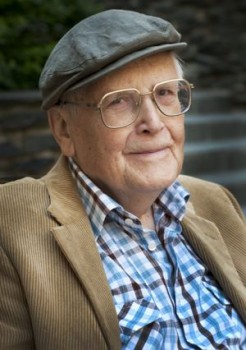The stars above
6 March 2014 | Authors, Reviews

Lars Huldén. Photo: Charlotta Boucht
The state of poetry in Finland has been the subject of heated debate in recent years. The focus of much of this attention has been so-called ‘experimental poetry’. Some commentators have gone as far as to suggest that, in its ability to reshape and reinvent itself, contemporary poetry serves as a model for other forms of literature.
In such a literary climate, a writer like Lars Huldén might easily be overlooked, a writer whose poems give honest expression to thoughts and moods. This Huldén achieves in a manner that is at once recognisable and inventive. His poems are, perhaps, close to what many assume poems should be: concise speech expressing the wisdom of experience and often revealing a clear sense of resignation – which is hardly surprising when you have reached the age of 88.
Huldén has composed many different kinds of texts. Alongside poetry he has written songs, revue scripts and, in collaboration with his son, translated into Swedish the national epic Kalevala and many other works besides. He has lectured in Nordic literature and has worked extensively in the theatre and various organisations.
Those who know Huldén will expect humour, irony and sardonic asides. His new volume Inga stjärnor i natt, sir* (‘No stars tonight, sir!’) presents life as a sea journey, a cruise. ‘Captain Nemo and his crew/trust you have had / the wonderful cruise/that you’d hoped you / deserved, especially as / it will be your only one.’
Transposing the traditional sea-journey metaphor on to a cruise ship is an effective and gently satirical trick: cruises have become trivial and mundane. At the very outset of the journey we meet ‘an old, old man’, who is never seen at the ship’s cabaret evenings or in the ballroom. All he wants to do is see the stars.
‘Before long, we’ll forget that there are stars in the sky,’ the eminent poet Paavo Haavikko once commented in an interview. This is precisely what has happened on the cruise, concentrating as it does merely on entertainment. Huldén’s critique is at its sharpest when he presents it subtly, almost by stealth. We have run away from fundamental elements, from nature. Without underlining matters, Huldén succeeds in pointing out that though the cruise ship offers lots of diversion, it is ultimately only a another way of running away from death, something none of us will escape.
At the end of the collection, Huldén convincingly links images of death to nature. He comments that from the window of a train running through fields of crops ‘you can see peculiar little islands, / sparsely covered with ash or aspen.’ The poem ends with the image of bails of burning straw, traditionally lit in the autumn ‘to the memory of our fathers’.
Huldén has written a great deal of dramatic lyrics for the theatre, so it is understandable that he wishes to give a clear warning of the destructive nature of our throw-away lifestyles. However, he is at his most impressive in apparently calm poems that seem to open up across an expansive landscape or time span.
Behind the mask of a resigned elderly man is the familiar old trickster who comes to warn us of confusing views from a train with those at sea, and who challenges us to write about things as they truly are – ‘if you dare’. That being said: ‘Poetry, by definition, has fled, / fled from things that / happen all the time.’
Huldén reminisces, dreams, ponders (ever)lasting love. We are left with the firm impression that he himself would flee no subject at all.
Translated by David Hackston
*) Inga stjärnor i natt, sir in Finnish: Ei tähtiä tänä yönä, sir (translated by Pentti Saaritsa, Siltala, 2013)
Tags: poetry
No comments for this entry yet
Leave a comment
Also by Jukka Koskelainen
Nature girl: on the poetry of Sirkka Turkka - 21 January 2010
A hole in the landscape - 30 September 2008
Abrupt bewitchment - 31 March 2003
Poetry and speech - 30 June 1996
-
About the writer
Jukka Koskelainen (born 1961) is a poet, translator and literary critic. The first of his three collections of poetry, Kierros (‘Cycle)’ appeared in 1995. He has published collections of essays and several translations of poetry, for example by Octavio Paz and Paul Celan. He lives in Helsinki.
© Writers and translators. Anyone wishing to make use of material published on this website should apply to the Editors.
